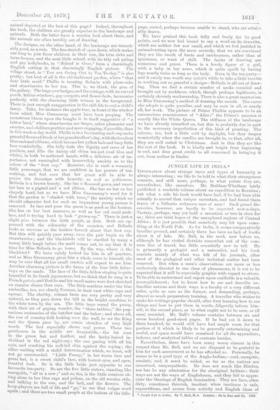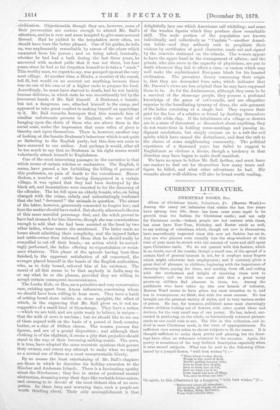JUNGLE LIFE IN INDIA.* INeonstilioN about strange races and types
of humanity is always interesting; we like to be told in what their strangeness consists, and still more, perhaps, in what points they are, nevertheless, like ourselves. Mr. Boddam-Whetham lately published a readable volume about an expedition to Roraima; but what a sale his book would have had, if he had been able actually to ascend that unique mountain, and had found there traces of a hitherto unknown race of men ! Such grand dis- coveries, however, are hardly to be expected now-a-days.. Tartary, perhaps, may yet hold a sensation or two in store for us ; there are faint hopes of the unexplored regions of Central Africa; it is just possible that somebody may hit upon some- thing at the North Pole. As for India, it seems comparatively familiar ground, and certainly there has been no lack of books about it of late. Mr. Ball, in the work now before us,. although he has visited districts somewhat out of the com- mon line of travel, has little essentially new to tell. He is primarily a geologist and a naturalist, and his book consists mainly of what was left of his journals, after most of the geological and other technical matter had been removed. But when a man's observations are more or less exclusively directed to ono class of phenomena, it is not to be expected that it will be especially graphic with regard to others.. To be able to understand and report upon coalfields is a valuable accomplishment; but to know how to see and describe un- familiar nations and their ways is a faculty of a very different order, quite as rare as the former, and demanding, perhaps, almost as much preparatory training. A traveller who wishes to make his writings popular should, after first learning how to see things and how to put them in words, diligently inform him- self, in the second place, as to what ought not to be seen, or (if seen) recorded. Mr. Ball's volume contains between six and seven hundred good-sized pages. If he had cut it down to three hundred, he would still have had ample room for that portion of it which is likely to be generally entertaining and useful, and space would have remained for all the appendices,. indexes, and analytical tables of contents besides.
Nevertheless, there have been many worse sinners in this respect than Mr. Ball, and we are disposed to be grateful to him for such amusement as he has afforded us. Personally, lie seems to be a good type of the Anglo-Indian,—cool, energetic,. resolute, and, it must be added, so far as the natives are concerned, unsympathetic. He does not much like Hindus, nor has he any admiration for the aboriginal Indians ; their ways are not the ways of Englishmen, and they fail to appre- ciate the blessings of English domination. They are liars, often dirty, sometimes thievish, insolent when insolence is safe,. superstitious, and averse from activity and English ideas of
* Jungle Life in India. By V. Ball, M.A. London : De la Rue and Co. 1880. civilisation. Objectionable though they are, however, some of their perversities are curious enough to attract Mr. Ball's attention, and he is ever and anon tempted to give some account thereof. Had he yielded to the temptation more ofteu, we should have been the better pleased. One of his guides, he tells us, was unpleasantly remarkable by reason of the odour which emanated from his person ; and on being asked, ironically, whether he had had a bath during the last three years, he answered with modest pride that it was not three, but four years, since he had so far forgotten himself as to take a "wash." This worthy man, we regret to say, was pumped upon at the very next village. At another time, a Hindu, a member of the escort, fell ill, but would on no account eat anything, because there was no one of his own or of a higher caste to prepare his food. Accordingly, he must have starved to death, had he not luckily become delirious, in which state he was incontinently fed by the irreverent hands of Mr. Ball himself. A Brahman, a lunatic, but not a dangerous one, attached himself to the camp, and appeared to take great comfort in making himself an appendage to it. Mr. Ball remarks hereupon that this reminds him of similiar unfortunate persons in England, who are fond of hanging upon the skirts of those who are above them in the social scale, under the impression that some reflex of glory is thereby cast upon themselves. There is, however, another way of looking at the lunatic Brahman's behaviour which is not quite so flattering to the English party, but this does not seem to have occurred to our author. And perhaps it would, after all be too much to say that no Brahman in his right senses would voluntarily attach himself to Englishmen.
One of the most interesting passages in the narrative is that which treats of certain witches or enchanters. The English, it seems, have passed a law forbidding the killing of persons of this profession, on pain of death to the executioner. Never- theless, a number of cattle having disappeared in a certain village, it was opined that they had been destroyed by the black art, and incantations were resorted to for the discovery of the offender. The lot fell upon an elderly female, who, on being charged with the crime, calmly and unhesitatingly confessed that she had " devoured " the animals in question. The owner of the latter, however, generously consented to forgive her; and here the matter should have ended. But shortly afterwards the son of this same merciful personage died, and the witch proved to Lave had stomach for him likewise, though she was conscientious enough to add that she had been assisted at the feast by two other ladies, whose names she mentioned. The latter made no bones about admitting their complicity, and the injured father and cattle-owner then informed them that he should really be compelled to cut off their heads,—an action which he accord- ingly performed, the ladies offering no expostulation or resist- ance whatever. This phase of the episode having been thus finished, to the apparent satisfaction of all concerned, the avenger placed himself in the hands of the English authorities, who, as in duty bound, relieved him of his existence. The moral of all this seems to be that anybody in India may do or say what he or she pleases, provided they are willing to accept certain consequent inconveniences.
The Lurka Dols, or Hoe, are a primitive and very conservative race, existing apart from Aryan influences, concerning whom we should have been willing to hear more. They have a habit of setting broad stone tablets on stone uprights, the effect of which, in the engraving that Mr. Ball gives us, is not un- suggestive of a small kind of Stonehenge. They have a notion —which we are told, and are quite ready to believe, is unique— that the milk of cows is unclean ; but we should like to see one of them argued with on the basis of a pound of fresh country butter, or a slice of Stilton cheese. The women possess fine figures, and are of a genial disposition ; and although their clothing is of the slightest, it seems a pity that prejudice should stand in the way of their becoming milking-maids. The cows, it is true, have adopted the same eccentric opinions that govern their owners, and resent any attempt to make what we regard as a normal use of them as a most unwarrantable liberty.
By no means the least entertaining of Mr. Ball's chapters are those in which he describes his holiday excursion to the Nicobar and Andaman Islands. There is a fascinating apathy about the Nicobarese ; they live in states of profound mental abstraction, dreaming away their days like veritable lotus-eaters, and seeming to be devoid of the most distant idea of an occu- pation. In these busy and worrying days, such a people are worth thinking about. Their only accomplishment is that delightfully lazy one which Americans call whittling; and some of the wooden figures which they produce show remarkable skill. The male portion of the population are known individually and collectively as " Captain "—another Ameri- can foible—and they artlessly seek to propitiate their visitors by certificates of good character, made out and signed by the convicts stationed on the islands. The women appear to have the upper hand in the management of affairs; and the priests, who also serve in the capacity of physicians, are put to death whenever they fail to effect a cure,—a custom which may well make the sophisticated European blush for his boasted civilisation. The prevalent theory concerning their origin is, that they are descended from ants, which indicates that Mr. Darwin's views are less original than he may have supposed them to be. As for the Andamanese, although they seem to be a survival of the stone-age people, they possess a profound knowledge of the game of cat's-cradle, and are altogether superior to the humiliating tyranny of dress, the sole garment of the ladies consisting of a single leaf. They express their grief for the loss of a relative or friend by daubing themselves over with white clay. If the inhabitants of a village or district are in a state of discontent or discomfort about anything, they do not waste time in holding mass-meetings and passing in- dignant resolutions, but simply conjure on to a raft the evil spirits which have caused the disturbance, and float the raft to the shores of some neighbouring community. The political experience of a thousand years has failed to suggest to Englishmen so obvious a device, though a tendency in that direction may have begun to make itself manifest.
We have no space to follow Mr. Ball farther, and must leave our readers to find out for themselves how many bears and tigers he killed, and what other adventures he had. His remarks about wolf-children will also be found worth reading.







































 Previous page
Previous page